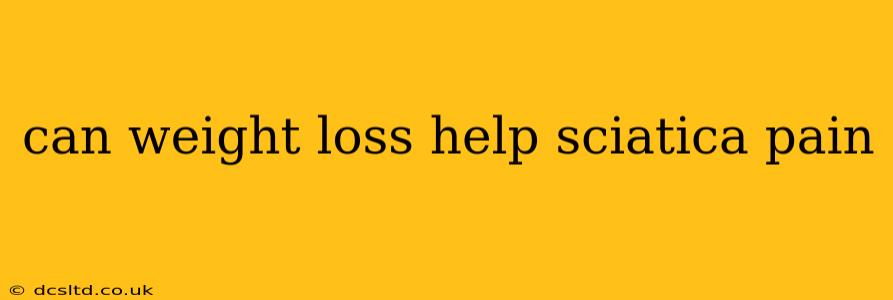Sciatica, that sharp, shooting pain radiating down your leg from your lower back, can be debilitating. Many sufferers search for relief, and weight loss is often suggested as a potential solution. But does shedding those extra pounds actually help with sciatica pain? The answer is a resounding, potentially, yes. Let's delve into the connection between weight and sciatica.
How Does Weight Contribute to Sciatica?
Excess weight puts extra pressure on your spine, particularly the lower back (lumbar spine). This increased pressure can:
- Exacerbate existing spinal conditions: If you already have conditions like spinal stenosis (narrowing of the spinal canal) or degenerative disc disease, extra weight significantly worsens the pressure on the sciatic nerve, leading to more intense sciatica.
- Increase inflammation: Carrying excess weight leads to chronic low-grade inflammation throughout the body, including the spine. This inflammation can irritate the sciatic nerve and contribute to pain.
- Strain muscles and ligaments: The added weight puts increased stress on the muscles and ligaments supporting your spine, potentially causing them to become strained or weakened. This can further compress the sciatic nerve.
- Impair posture: Carrying extra weight often leads to poor posture, which can further contribute to spinal misalignment and nerve compression.
Weight Loss and Sciatica Pain Relief: The Positive Impact
Losing weight, even a moderate amount, can significantly alleviate sciatica pain by reversing many of the negative effects mentioned above. Here's how:
- Reduced Spinal Pressure: Shedding pounds directly reduces the pressure on your spine, lessening the compression on the sciatic nerve and easing pain.
- Decreased Inflammation: Weight loss is associated with a reduction in systemic inflammation, potentially lessening the irritation of the sciatic nerve.
- Improved Posture: As you lose weight, you may naturally improve your posture, reducing strain on your back and promoting better spinal alignment.
- Stronger Core Muscles: Weight loss often goes hand-in-hand with increased physical activity, which strengthens your core muscles. Stronger core muscles provide better support for your spine, further reducing pressure on the sciatic nerve.
How Much Weight Loss Is Necessary?
There's no magic number, but even a modest weight loss can make a noticeable difference. Even a 5-10% reduction in body weight can significantly reduce the strain on your spine and alleviate sciatica pain. Your doctor or physical therapist can help you determine a healthy and realistic weight loss goal based on your individual needs and health status.
What Other Factors Contribute to Sciatica?
While weight is a significant factor, sciatica can be caused by a range of other issues, including:
- Herniated disc: A ruptured or bulging disc in your spine can press on the sciatic nerve.
- Spinal stenosis: Narrowing of the spinal canal puts pressure on the nerve roots.
- Piriformis syndrome: This condition involves the piriformis muscle compressing the sciatic nerve.
- Spondylolisthesis: A condition where one vertebra slips forward over another.
- Pregnancy: The hormonal changes and physical stress of pregnancy can contribute to sciatica.
It's crucial to remember that weight loss alone may not solve all cases of sciatica. Other treatments, such as physical therapy, medication, and in some cases, surgery, might be necessary.
Does Weight Loss Guarantee Sciatica Relief?
No, weight loss doesn't guarantee complete sciatica relief for everyone. The effectiveness of weight loss in treating sciatica depends on several factors, including the underlying cause of the sciatica, the severity of the condition, and the individual's overall health.
How Can I Lose Weight Safely and Effectively?
Weight loss should always be approached in a healthy and sustainable way. Consult your doctor or a registered dietitian to create a personalized plan that's right for you. They can help you determine a safe and effective weight loss strategy that takes into account your individual needs and health status.
What If Weight Loss Doesn't Help My Sciatica?
If you've lost weight and still experience significant sciatica pain, it's essential to seek professional medical advice. Your doctor can help determine the underlying cause of your pain and recommend appropriate treatment options.
By addressing excess weight and improving overall health, you can significantly improve your chances of finding relief from sciatica pain. Remember to consult with your healthcare provider before starting any weight loss program or treatment for sciatica. They can provide tailored advice and guidance based on your specific circumstances.
